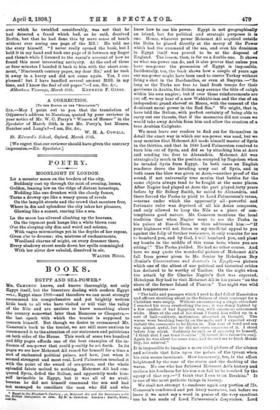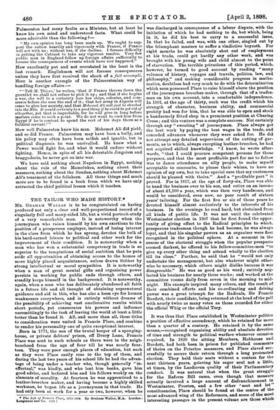BOOKS.
EGYPT AND SEA-POWER.*
a. CAMERON knows, and knows thoroughly, not only Egypt itself, but the literature dealing with modern Egypt —i.e., Egypt since 1800—and therefore we can most strongly recommend his comprehensive and yet brightly written little book to all who have visited or will visit the valley of the Nile and are anxious to know something about the country somewhat later than Rameses or Cleopatra,— the last epoch with which the tourist is supposed to concern himself. But though we desire to recommend Mr. Cameron's book to the tourist, we are still more anxious to recommend it to the attention of our statesmen and politicians on both sides of the House. This work of some two hundred and fifty pages affords one of the best examples of the in- fluence of sea-power that could possibly be set forth. In its Pages we see how Mehemet Ali raised for himself for a time a sort of enchanted political palace, and how, just when it seemed strongest and most real, Lord Palmerston touched it with the point of the sword of sea-power, and the whole splendid fabric melted to nothing. Mehemet Ali had con- quered Syria, defied the Sultan, and apparently made him- self invincible in Egypt, but it was all of no avail, because he did not himself command the sea and had not managed to conciliate the man who did and who • RitYlpi in the Nineteenth Century; or, Mehemet AU and his Suzcesaors unta the British Occupation tre lase. By D. A. Camerun. Loi.bai tnnith, Elder, and GA knew how to use his power. Egypt is not geographically an island, but for political and strategic purposes it is one. Hence, whatever power Mehemet Ali acquired outside the Delta he placed directly at the mercy of the Power which had the command of the sea, and even his dominion in Egypt itself was proved to be at the disposal of England. The lesson, then, is for us a double one. It shows
us what sea-power can do, and it also proves that unless you have sea.-power the possession of Egypt is impossible.
Incidentally, too, the book shows how a couple of years ago our sea-power might have been used to coerce Turkey without firing a shot in the Dardanelles, or even at Smyrna :—' So long as the Turks are free to land fresh troops for their
garrisons in Arabia, the Sultan may assume the title of caliph within his own empire; but if ever those reinforcements are cut off, we may hear of a new Wahhilbi-ism and the rise of an
independent grand shereef at Mecca, with the consent of the dominant naval power in the Red Sea." We might, that is, have told the Sultan, with perfect certainty of being able to carry out our threats, that if the massacres did not cease we would take away Arabia from him and allow the creation of a true Arabian Caliphate.
We must leave our readers to find out for themselves in detail the exact way in which our sea-power was used, but we may mention that Mehemet Ali made himself master of Syria in the thirties, and that in 1840 Lord Palmerston resolved to turn him out of Syria, and did so by attacking him at Acre and sending the fleet to Alexandria. Mehemet Ali was strategically much in the position occupied by Napoleon when he invaded Syria from Egypt. In both cases an English sea-force drove the invading army out of Syria, and in both cases the blow was given at Acre,—another proof of the sound, if not universally true maxim that battles for the same objects always tend to be fought at the same places. After Napier had played at Acre the part played forty years before by Sir Sidney Smith, he sailed to Alexandria, and there forced the Pasha to yield to Lord Palmereton.'s terms, —terms under which the apparently all - powerful and fortunate ruler was deprived of all his Asian conquests, and only allowed to keep the Nile as a piece of con- temptuous good nature. Mr. Cameron mentions the local tradition that when Napier went to see the Pasha in
his palace at Ras-el-Teen, he thus addressed him :—" 11 your highness will not listen to my uncffi.tial appeal to you against the folly of further resistance, it only remains for me to bombard you, and by God, I will bombard you, and plait my bombs in the middle of this room here, where you are sitting !" The Pasha yielded. He had no other coarse. And here we may quote the wonderful picture of Mehemet Ali'a fall from power given to Mr. Senior by Hekekyan Bey (Senior's Conversations and Toztmals hi Em.iit),—a picture
which one of the ablest of our political and historical critics has declared to be worthy of Tacitus. On the night when the attack by Sir Charles Napier's fleet was expected, Hekekyan Bey had to visit Mehemet Ali in his palace "on the shore of the former Island of Pharos." Tee night was wild and tempestuous
"The halls and passages which I used to find fall of Mamelukes and officers strutting about iu the fulness of their contempt for a Christian were empty. Without encountering a single attendant I reached his room overlooking the sea, it was dimiy liErhted by a few candles of bad Egyptian wax, with enormou-1 untrimmed wicks. Here at the end of his divan I found him rolled up in a sort of ball—solitary, motionless, ab,or bed in thought. The waves were breaking heavily on the mole, and I expected every instant the casements to be blown in. The roar of wind and sea was almost awful, but he did not seem cobscious of it. I stood before him silent. Suddenly he said, ;is if speaking to himself, 'I think that lean trust Ibrahim ' [M,,heniet Ali's favourite soul Again he was silent for some time, aiJ de.,ired me to fetch Motus Bey, his admiral."
It is impossible to imagine a more vivid picture of the silence and solitude that falls upon the palace of the tyrant when his rain seems imminent. How ituinense!y, too, is the effect heightened by the roar of the storm and the dashing of the waves. No one who has followed Mehemet Al's history and realises his fondness for his son cm n fail to he touched by the agony of that cry,—"I think that I can tr:Ist Ibrahim." It is one of the most pathetic things in history.
We shall not attempt to condense again any portion of Ur. Cameron's condensed and yet lively narrative, but before we leave it we must say a word in praise of the very excellent use he has made of Lord Palmerston's despatches. Lord
Palmerston had many faults as a Minister, but at least he knew his own mind and understood facts. What could be more admirable than the following ?—
" My own opinion has long been made up. We ought to sup- port the sultan heartily and vigorously with France, if France will act with US; without her, if she decline. I foresee difficulty in getting the Cabinet to take any vigorous resolve. Very few public men in England follow up foreign affairs sufficiently to foresee the consequences of events which have NOT happened."
How excellently put and not overstated in the least is the last remark. Englishmen will not foresee consequences unless they have first received the shock of a fait accompli. Here is another example of the Palmerstonian way of handling foreign affairs :—
" Tell M. Thiers,' he writes, that if France throws down the gauntlet we shall not refuse to pick it up ; and that if she begins a war, she will to a certainty lose her ships, colonies, and com- merce before she sees the end of it ; that her army in Algeria will cease to give her anxiety, and that Mehemet Ali will just be chucked into the Nile. It would certainly be a good thing if he could be got rid of altogether, yet that is improbable, for he will give in long before natters come to such a point. We do not want to oust him from Egypt if he is content to spend the rest of his days there as a faithiul servant.'"
How well Palmerston knew his man. Mehemet All did yield, and so did France. Palmerston may have been a bully, and his policy may often have been selfish and ignoble, but in political diagnosis he was unrivalled. He knew what a Power would fight for, and what it would endure without fighting. Hence, in spite of all his detestable Jingoism and braggadocio, he never got us into war.
We have said nothing about Napoleon in Egypt, nothing about the rule of the Mamelukes, nothing about their massacre, nothing about the Soudan, nothing about Mehemet Ali's treatment of the fellaheen. All these things and much more are to be found in a book from which we have only extracted the chief political lesson which it teaches.



































 Previous page
Previous page